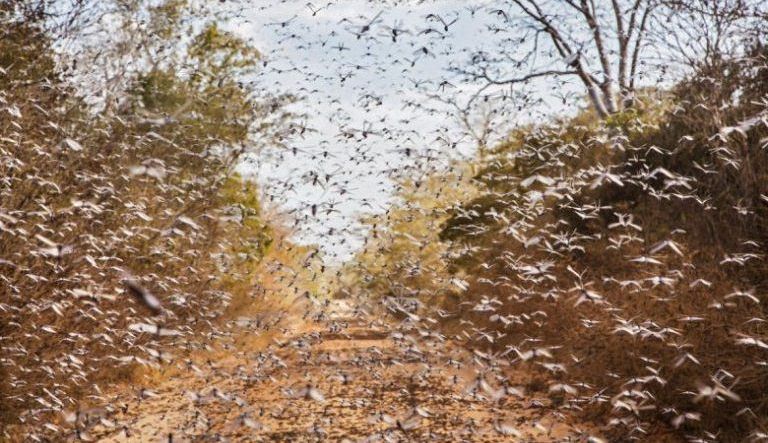By: Sarah Ooko
Send to a friend
The details you provide on this page will not be used to send unsolicited email, and will not be sold to a 3rd party. See privacy policy.
[NAIROBI] Desert locusts could boost food security and offer protection against chronic diseases, according to researchers studying the insects.
The WHO says non-communicable diseases such as heart attacks, stroke, cancers, diabetes and asthma kill about 28 million people a year in low- and middle-income countries, including those in Sub-Saharan Africa.
In a new study published in PLOS One last month (13 May), researchers based in Kenya and the United States assessed whether locusts contain high levels of chemicals known as phytosterols that could control heart-related diseases.
Baldwyn Torto, a scientist with the International Centre of Insect Physiology and Ecology (icipe) in Kenya, who led the study, says that phytosterols block the absorption of cholesterol, a chemical which increases one’s risk of getting heart and other cardiovascular diseases.
“They are also rich in proteins, fatty acids and minerals that boost immunity, fight cancer and prevent inflammation of body organs.”
Baldwyn Torto, The International Centre of Insect Physiology and Ecology (icipe)
He adds: “They are also rich in proteins, fatty acids and minerals that boost immunity, fight cancer and prevent inflammation of body organs.”
Kate Kibarah, a clinical nutritionist in Kenya, says that food sources which contribute to the fight against non-communicable diseases should be promoted, adding that based on the findings of the study, desert locusts as a food source should be promoted.
Kibarah notes that many Africans are now dealing with ailments such as hypertension and cancers due to sedentary lifestyles and bad dietary habits.
“Instead of consuming fast foods all the time, we should eat quality food with nutrients that help us to ward off deadly diseases,” Kibarah says. “People should also exercise to keep fit.”
The WHO states that strong evidence demonstrates that compared to less active adult men and women, individuals who are more active have lower rates of all-cause mortality, coronary heart disease, high blood pressure, stroke, type 2 diabetes, metabolic syndrome, colon and breast cancer and depression.
According to the researchers, although plants are generally the richest sources of phytosterols, insects such as locusts that feed on them can provide alternative sources for these nutrient-rich compounds to humans.
The study found that after 200-250 desert locusts — Schistocerca gregaria — reared in icipe were fed on wheat seedlings and wheat bran, they consumed the phytosterols from these plants and amplified them, thus resulting in the insects having higher amounts of phytosterols compared to the wheat.
According to Torto, the study has introduced a new positive perspective about desert locusts, which were previously only considered a threat to food security due to their ability to damage various crops, mainly cereals, in the Sahel region of Africa.
Major locust outbreaks have occurred in Djibouti, Eritrea, Ethiopia, Madagascar and Somalia. “But they [desert locusts] can now be used to boost food and nutritional security in Africa,” Torto says.
This article has been produced by SciDev.Net's Sub-Saharan Africa desk.
References
Xavier Cheseto and others Potential of the desert Locust Schistocerca gregaria (Orthoptera: Acrididae) as an unconventional source of dietary and therapeutic sterols (PLOS One, 13 May 2015)














